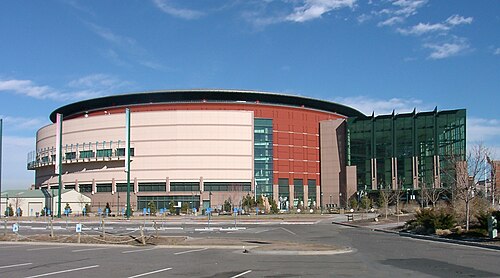Guy Patrice Lumumba, son of the first elected Prime Minister of the Democratic Republic of Congo, discussed the legacy of his father and the role of American youth in ending the ongoing humanitarian crisis in the Congo Thursday at the Newman Center for the Performing Arts.
“[In the] last letter that [Patrice] Lumumba [Sr.] wrote which is to his children, he called on his children to struggle for liberty equality and freedom. [However] I’m here not so much to talk about the death of my father but to talk about the present and the future [of the Congo],” Lumumba said.
Lumumba spoke in French while Professor Robert Prince translated.
Lumumba’s comments followed a brief talk by Executive Director of Friends of the Congo, Maurice Carney.
Carney and Lumumba were the keynote speakers of DU’s Breaking the Silence Congo week, which included lectures and events every day last week.
Lumumba told the audience that about six million Congolese people died between the years 1998 and 2003 in what he called”genocide” under the leadership that took control of the country years after his father’s assassination.
Today, Lumumba said, 20,000 people die every month in the Congo, most of them children.
“I hope that in the two years before the next presidential election that university students can be the “motor of change,” said Lumumba.
Events during Breaking the Silence Week were geared toward raising awareness of the humanitarian crisis in the Congo, a poor country whose people have suffered from the continuous looting and exploitation of its wealth of natural resources, said Carney.
“The challenge that [the people of the Congo] face is both an external one and an internal one.
To achieve human dignity, to control resources for own benefit, they need friends on the outside.
People in 35 countries are mobilizing this week to break the silence around the Congo,” Carney said during the talk.
The Congo, a large country in central Africa, won its independence from Belgium, which had controlled the country’s many natural resources since the late 1800s, in 1960 under the leadership of Patrice Lumumba.
Today, the Congo is rich in the natural resources that power cell phones, hybrid cars and nuclear energy.
However, the Congolese people continue to suffer for their country’s natural wealth, rather than benefit from it.
“The Congo is a geological scandal, so much wealth located in one space. Who’s going to control Congo’s spectacular wealth and to who’s
benefit?
The international community has systematically looted the Congo. The Congolese people [have the right to] control resources for their own benefit,” Carney said.
Breaking the Silence week, which ended Friday, also included talks by Rebecca Singer, a nurse for Doctors without Borders, Regina Germain, legal director for the Rocky Mountain Survivor Center Prince, a “cell out” campaign encouraging DU community members to call their senators urging them to support legislation benefitting the Congo and the screening of the film “Lumo.”
Information on ways to get more involved in helping the people of the Congo can be found on the Friends of the Congo’s website, www.friendsofthecongo.org.











